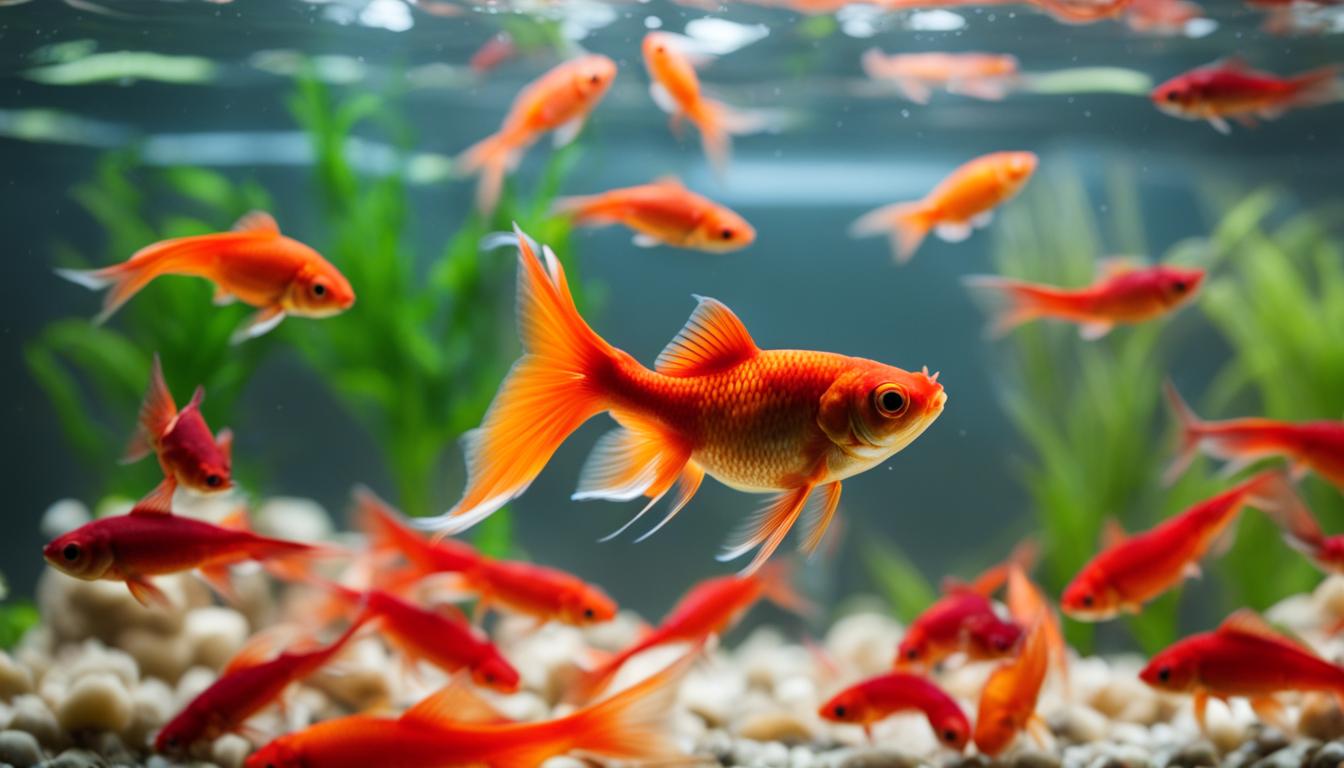Last Updated on 6 months by admin
Goldfish owners often struggle to find the best foods to ensure their pets receive essential nutrients, color-enhancing ingredients, and necessary roughage. Bloodworms are a popular choice for feeding goldfish, as they provide a wide range of benefits. However, like any dietary choice, there are pros and cons to consider. In this article, we will explore the nutritional value of bloodworms for goldfish, their potential benefits and risks, and how to incorporate them into a goldfish’s diet effectively.
Key Takeaways:
- Bloodworms are a nutritious source of protein, vitamins, and minerals for goldfish.
- Feeding bloodworms to goldfish can enhance their coloration and provide mental stimulation.
- It is important to incorporate bloodworms as part of a varied and balanced diet.
- Handling bloodworms may pose allergic risks, and caution should be taken.
- Recommended brands for bloodworms include Saki-Hikari, San Francisco Bay Brand, Omega One, and Hikari.
The Nutritional Value of Bloodworms for Goldfish
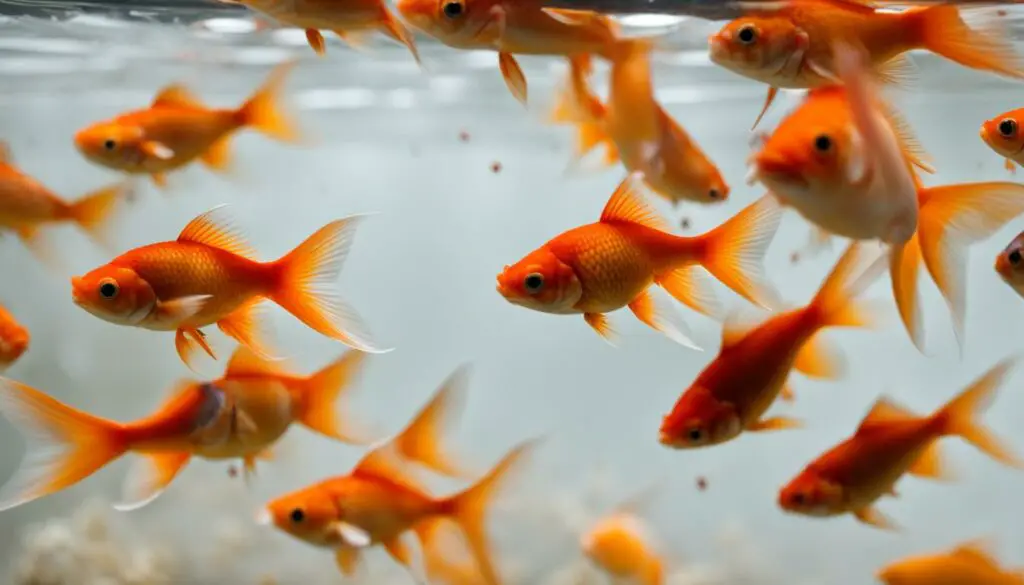
Bloodworms are a popular choice for feeding goldfish due to their high nutritional value. These small aquatic larvae are rich in essential nutrients that contribute to the overall health and well-being of goldfish. One of the main benefits of bloodworms is their high protein content, which is essential for goldfish growth and repair. Protein provides the building blocks for muscle development and supports various bodily functions.
Additionally, bloodworms contain vitamins and minerals that are crucial for goldfish health. These micronutrients support immune function, promote optimal organ function, and contribute to overall vitality. By incorporating bloodworms into a goldfish’s diet, owners can ensure that their pets receive these essential nutrients that are sometimes lacking in other types of fish food.
Bloodworms also provide a natural source of roughage for goldfish. The presence of roughage in a goldfish’s diet is important for proper digestion and helps prevent constipation. Adding bloodworms to a goldfish’s diet can contribute to maintaining a healthy digestive system and reducing the risk of gastrointestinal issues.
Goldfish owners often appreciate bloodworms not just for their nutritional value, but also because they can promote the vibrant coloration of these beautiful aquatic pets. The natural pigments found in bloodworms can enhance the natural colors of goldfish, making their patterns and hues more pronounced and visually appealing.
The Nutritional Composition of Bloodworms
Let’s take a closer look at the nutritional composition of bloodworms for goldfish. The table below provides an overview of the key nutrients present in bloodworms:
| Nutrient | Amount per 100g |
|---|---|
| Protein | 15g |
| Fat | 1.5g |
| Carbohydrates | 2g |
| Vitamin A | 12000 IU |
| Vitamin C | 10mg |
| Calcium | 50mg |
| Iron | 2.5mg |
This nutritional composition highlights the protein-rich nature of bloodworms, as well as the presence of essential vitamins and minerals. The table serves as a valuable reference for goldfish owners who want to ensure that their pets receive a well-balanced and nutritious diet.
Overall, bloodworms offer significant nutritional value for goldfish. They are a rich source of protein, vitamins, and minerals that contribute to growth, immune function, and overall well-being. However, it is important to remember that bloodworms should be used as part of a varied and balanced diet for goldfish. By incorporating bloodworms alongside other high-quality fish foods, goldfish owners can provide their pets with a nutritional boost while promoting optimal health and vitality.
Benefits of Feeding Bloodworms to Goldfish
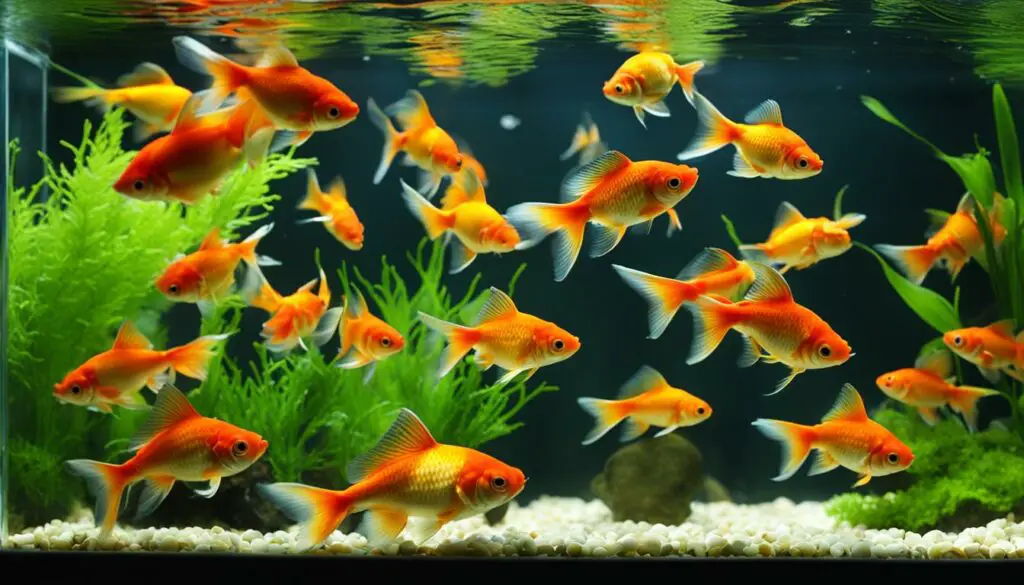
Feeding bloodworms to goldfish can offer several benefits. Firstly, bloodworms are highly palatable to goldfish, making them a great way to entice picky eaters to consume their food. Goldfish can be notoriously selective when it comes to food, but the enticing aroma and taste of bloodworms is often irresistible to them. By incorporating bloodworms into their diet, you can ensure that your goldfish are getting the nutrition they need to thrive.
Another benefit of feeding bloodworms to goldfish is the potential enhancement of their coloration. Bloodworms contain pigments and color-enhancing compounds that can make the vibrant patterns and colors of goldfish more pronounced. This can result in visually stunning and beautiful fish that are a joy to behold. By adding bloodworms to their diet, you can help your goldfish achieve their full color potential.
In addition to being palatable and color-enhancing, bloodworms provide a natural source of variety in a goldfish’s diet. Goldfish require a balanced diet that includes a mix of proteins, vegetables, and other nutrients. Offering bloodworms as part of their diet can help prevent nutritional deficiencies and ensure that they receive a diverse range of nutrients to support their overall health and well-being.
Table: Comparison of Goldfish Diets with and without Bloodworms
| Goldfish Diet without Bloodworms | Goldfish Diet with Bloodworms | |
|---|---|---|
| Palatability | May be less enticing for picky eaters | Highly palatable and enticing for goldfish |
| Color Enhancement | Colors may not be as vibrant | Can enhance the coloration of goldfish |
| Variety | May lack diversity in nutrients | Provides a natural source of variety in diet |
“Feeding bloodworms to my goldfish has been a game-changer. They love the taste and gobble them up with enthusiasm. Not only have I noticed their colors becoming more vibrant, but they also seem more active and energetic. I highly recommend incorporating bloodworms into your goldfish’s diet for the numerous benefits they offer.” – Goldfish Owner
In conclusion, feeding bloodworms to goldfish can provide numerous benefits. They are highly palatable, enhance coloration, and offer a natural source of variety in their diet. By including bloodworms in their feeding routine, goldfish owners can ensure that their fish receive the necessary nutrition for optimal health and enjoyment. Just remember to feed bloodworms in moderation as part of a balanced diet, and consult with a veterinarian or fish expert for personalized advice on feeding goldfish.
Potential Risks of Bloodworms for Goldfish
While bloodworms can offer many benefits, there are also potential risks to consider. One concern is the potential for allergic reactions in humans who handle bloodworms. Some people may be allergic to the proteins found in bloodworms and can experience symptoms such as skin irritation, asthma, and other allergic reactions. It is important for individuals who handle bloodworms regularly to take precautions, such as wearing gloves and washing their hands thoroughly after contact. Another risk is that goldfish may become too reliant on bloodworms and may not receive a balanced diet. It is important to incorporate bloodworms as part of a varied and balanced diet for goldfish.
When feeding bloodworms to goldfish, there are a few considerations to keep in mind. Firstly, it is essential to ensure that the bloodworms are of high quality and free from contaminants. It is best to purchase bloodworms from reputable sources and to follow proper storage and handling guidelines. Secondly, it is important to vary the diet of goldfish and not rely solely on bloodworms. A varied diet ensures that goldfish receive all the necessary nutrients for optimal health. Lastly, it is crucial to avoid overfeeding bloodworms to prevent digestive issues and water quality problems in the tank.
| Pros of Feeding Bloodworms to Goldfish | Cons of Feeding Bloodworms to Goldfish |
|---|---|
|
|
Overall, while bloodworms can be a valuable addition to a goldfish’s diet, it is important to consider the potential risks and take necessary precautions. By following proper handling and feeding practices, goldfish owners can ensure that their pets receive the benefits of bloodworms without putting their health at risk. Remember to consult with a veterinarian or fish expert for personalized advice on feeding goldfish.
Incorporating Bloodworms into a Goldfish’s Diet
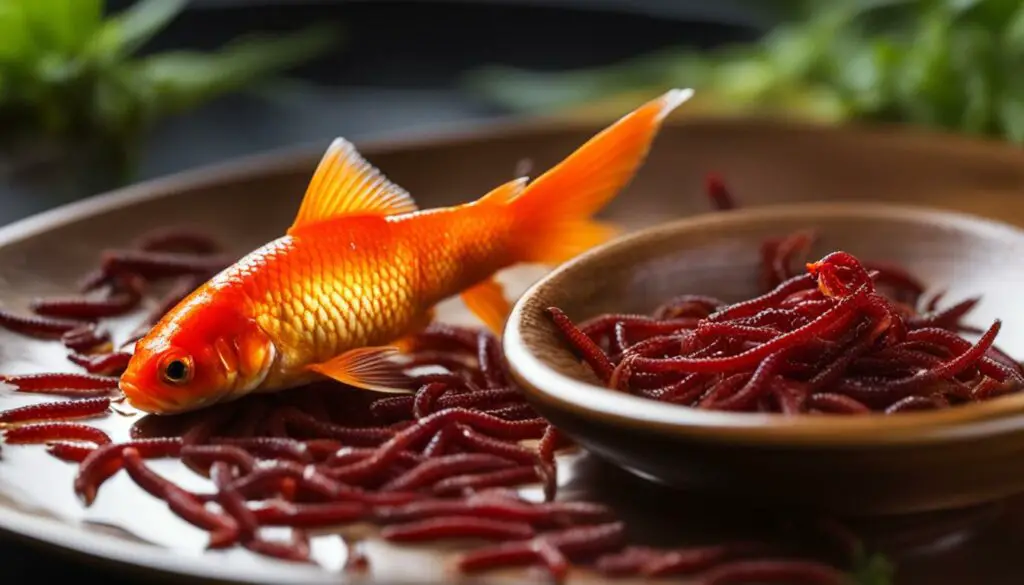
When it comes to incorporating bloodworms into a goldfish’s diet, moderation is key. Bloodworms should be used as a supplement or treat rather than the primary food source. A balanced diet for goldfish should consist of a variety of foods, including high-quality pellets, vegetables, and other protein sources. Bloodworms can be offered as a treat a few times a week, either in their frozen or freeze-dried form.
Before feeding bloodworms to goldfish, it is important to thaw frozen bloodworms and remove any uneaten portions after a few minutes to prevent water contamination. When feeding goldfish, it is crucial to ensure that the bloodworms are of high quality and free from contaminants. Purchasing bloodworms from reputable sources and following proper storage and handling guidelines is essential. It is also important to avoid overfeeding bloodworms to prevent digestive issues and water quality problems in the tank.
| Key Points | Action |
|---|---|
| Use bloodworms as a supplement or treat | Incorporate bloodworms into a goldfish’s diet a few times a week |
| Offer bloodworms in their frozen or freeze-dried form | Thaw frozen bloodworms before feeding |
| Remove any uneaten bloodworms after a few minutes | Prevent water contamination |
| Select high-quality bloodworms from reputable sources | Ensure bloodworms are free from contaminants |
| Avoid overfeeding bloodworms | Prevent digestive issues and water quality problems |
By following these guidelines, goldfish owners can successfully incorporate bloodworms into their pets’ diet while ensuring their overall health and well-being.
Feeding Considerations for Bloodworms
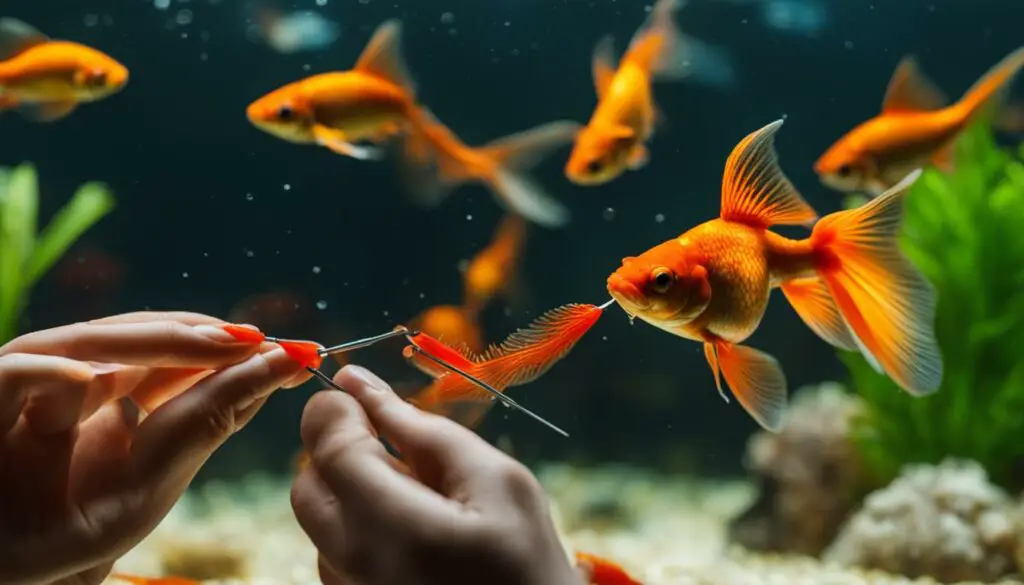
When it comes to feeding bloodworms to your goldfish, there are a few important considerations to keep in mind. First and foremost, you want to ensure that the bloodworms you are feeding your goldfish are of high quality and free from any contaminants. To ensure this, it’s best to purchase bloodworms from reputable sources and follow proper storage and handling guidelines.
It’s also crucial to remember that bloodworms should not be the sole source of food for your goldfish. While they offer nutritional benefits, it’s important to provide a varied diet to ensure your goldfish receives all the necessary nutrients for optimal health. Consider incorporating high-quality pellets, vegetables, and other protein sources into their diet.
Overfeeding bloodworms can lead to digestive issues and poor water quality in your goldfish tank. To avoid this, it’s best to feed small portions multiple times a day and observe your goldfish’s behavior to gauge the appropriate amount. Removing any uneaten food after a few minutes will help prevent water contamination.
The Importance of Varied Diet
Offering a variety of foods is crucial for goldfish health. A diverse diet ensures that your goldfish receives all the necessary nutrients for optimal growth, coloration, and overall well-being. While bloodworms can be a beneficial addition, it’s essential to supplement them with other high-quality foods.
| Food | Benefits |
|---|---|
| High-quality pellets | Provides essential nutrients and promotes overall health |
| Vegetables | Offers additional fiber and nutrients |
| Other protein sources (brine shrimp, daphnia, etc.) | Provides variety and essential amino acids |
By incorporating a range of foods into your goldfish’s diet, you can ensure they receive a balanced and nutritious meal every day.
How Bloodworms Improve Goldfish Health
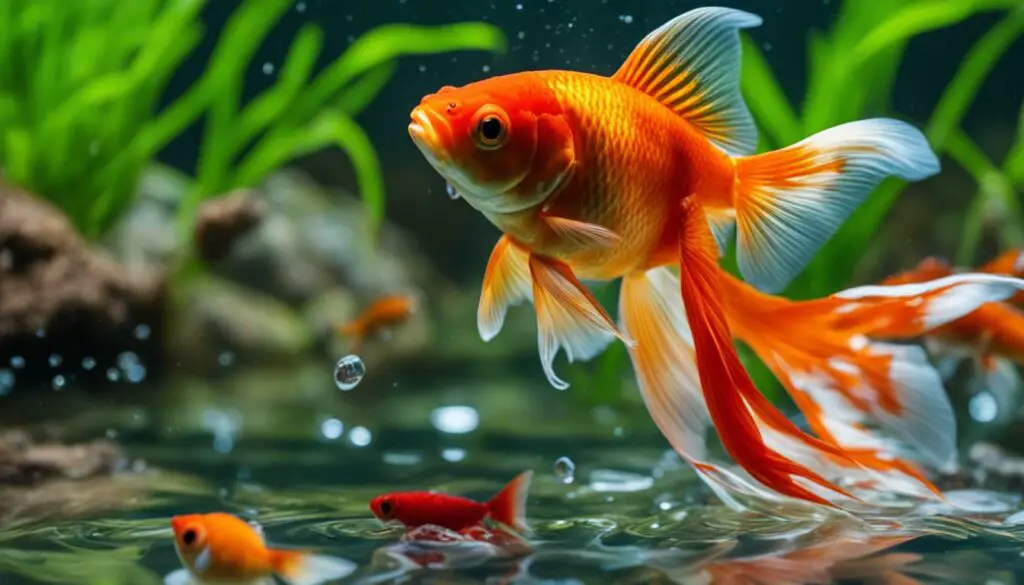
Bloodworms offer several health benefits for goldfish, contributing to their overall well-being and vitality. The high protein content in bloodworms promotes growth and muscle development in goldfish, ensuring that they reach their full potential. The essential amino acids present in bloodworms support various bodily functions, including tissue repair and immune system function. This helps goldfish maintain optimal health and increases their resistance to diseases.
Furthermore, the natural roughage found in bloodworms aids in digestion and helps prevent constipation in goldfish. This is important as constipation can lead to swim bladder disorders and other digestive issues. By incorporating bloodworms into a goldfish’s diet, owners can help ensure healthy digestion and minimize the risk of gastrointestinal problems.
In addition to protein and roughage, bloodworms are also a rich source of vitamins and minerals that are essential for goldfish health. These nutrients contribute to a strong immune system, enabling goldfish to fight off infections and diseases more effectively. They also support overall well-being and help goldfish maintain their vibrant colors and energy levels.
By including bloodworms as part of a balanced diet for goldfish, owners can help improve their pet’s health and quality of life. However, it is important to remember that bloodworms should not be the sole food source for goldfish. A varied diet that includes other high-quality foods such as pellets, vegetables, and other protein sources is crucial for meeting all of their nutritional needs. Consult with a veterinarian or fish expert for personalized advice on incorporating bloodworms into your goldfish’s diet.
Recommended Brands of Bloodworms for Goldfish
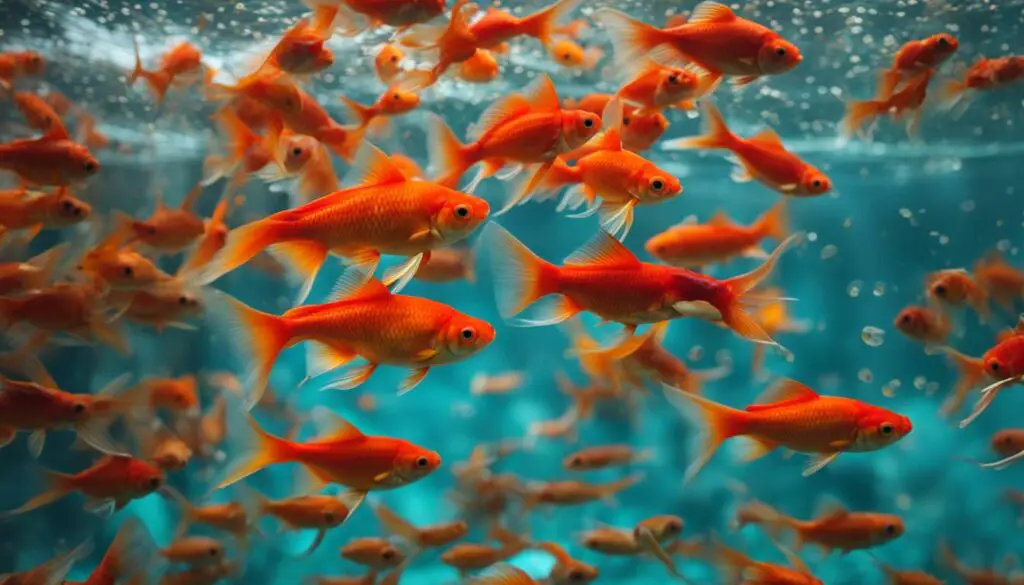
If you’re considering incorporating bloodworms into your goldfish’s diet, it’s important to choose high-quality brands that offer nutritious and safe options. Here are some recommended brands that provide bloodworms specifically formulated for goldfish:
| Brand | Description |
|---|---|
| Saki-Hikari | Saki-Hikari offers frozen bloodworms that are free from contaminants and provide excellent nutritional value for goldfish. |
| San Francisco Bay Brand | San Francisco Bay Brand provides freeze-dried bloodworms that are highly regarded for their quality and nutritional content. |
| Omega One | Omega One offers freeze-dried bloodworms that are rich in protein and essential nutrients, promoting overall health for goldfish. |
| Hikari | Hikari provides frozen and freeze-dried bloodworms that are carefully processed to preserve their nutritional value and quality. |
When choosing a brand, it is important to follow the feeding recommendations provided and to consider the specific needs of your goldfish. Look for brands that have a good reputation and prioritize the health and well-being of your goldfish.
Remember, bloodworms should be used as a supplement or treat in a goldfish’s diet, and a variety of other high-quality foods should also be included to ensure a balanced and nutritious meal.
By selecting the right brands of bloodworms for your goldfish and combining them with a diverse diet, you can help provide your goldfish with the essential nutrients they need for optimal health and well-being.
Alternative Foods for Goldfish
While bloodworms can be a beneficial addition to a goldfish’s diet, it is important to offer a variety of other foods to ensure a balanced diet. Incorporating alternative foods can provide additional nutrients and prevent nutritional deficiencies. Here are some alternative foods that can be included in a goldfish’s diet:
- High-quality pellets: Specifically formulated pellets for goldfish should be the staple food. These pellets are designed to provide essential nutrients and promote healthy growth.
- Vegetables: Blanched peas, lettuce, and zucchini can be included in a goldfish’s diet. These vegetables offer fiber and additional vitamins and minerals.
- Other protein sources: Brine shrimp, daphnia, and frozen or freeze-dried krill are excellent protein sources for goldfish. They provide variety and important nutrients for overall health.
By offering a diverse diet, goldfish can receive a wide range of nutrients necessary for their well-being. It is important to feed these alternative foods in moderation and ensure they are of high quality.
| Food | Benefits | How to Feed |
|---|---|---|
| High-quality pellets | – Specifically formulated for goldfish – Provide essential nutrients and promote growth |
– Feed small portions multiple times a day – Adjust the feeding amount based on goldfish behavior |
| Vegetables | – Offer fiber and additional vitamins and minerals – Provide variety in the diet |
– Blanch peas, lettuce, or zucchini before feeding – Cut into small pieces for easy consumption |
| Other protein sources | – Brine shrimp, daphnia, or krill offer variety and important nutrients – Support muscle development and overall health |
– Feed as a treat a few times a week – Thaw frozen options before feeding |
Best Practices for Feeding Goldfish
Feeding goldfish properly is essential for their health and well-being. By following a few best practices, you can ensure that your goldfish receive a balanced diet and thrive. Here are some tips to keep in mind:
1. Feed small portions multiple times a day: It’s important to avoid overfeeding goldfish, as this can lead to obesity and poor water quality. Instead, offer small portions of food multiple times throughout the day. This allows the goldfish to eat at a steady pace and helps prevent digestive issues.
2. Observe your goldfish’s behavior: Pay attention to how your goldfish behave during feeding. If they are eagerly consuming the food and showing no signs of distress, it’s a good indication that you are providing the right amount. If they hesitate to eat or exhibit signs of discomfort, adjust the portion size accordingly.
3. Remove any uneaten food: Goldfish have a tendency to overeat, so it’s important to remove any uneaten food from the tank after a few minutes. This helps maintain water quality and prevents the food from decomposing and causing health issues for the goldfish.
4. Maintain optimal water quality: Regularly test the water quality and make sure it is at optimal levels for goldfish. Poor water quality can negatively impact their health and digestion. Regular water changes and proper filtration are key to providing a healthy environment for your goldfish.
By following these best practices, you can ensure that your goldfish receive the proper nutrients and enjoy a healthy and balanced diet. Remember, each goldfish is unique, so it’s important to observe their behavior and adjust their feeding routine accordingly.
Common Mistakes to Avoid in Goldfish Feeding
Feeding goldfish requires careful consideration to ensure their health and well-being. However, there are some common mistakes that goldfish owners should avoid to maintain optimal nutrition and prevent potential issues. Here are the key mistakes to watch out for when feeding goldfish:
- Overfeeding: One of the most common mistakes is overfeeding goldfish. Feeding them too much food can lead to obesity, digestive problems, and poor water quality. It is important to feed goldfish in moderation and provide them with the right amount of food for their size and activity level.
- Not offering a varied diet: Goldfish need a balanced diet that includes a variety of foods to ensure they receive all the necessary nutrients. Relying solely on one type of food, such as bloodworms, can result in nutritional deficiencies. It is important to offer a mix of high-quality pellets, vegetables, and other protein sources to meet their dietary needs.
- Improper storage and handling of fish food: Storing and handling fish food properly is crucial to maintain its quality and prevent contamination. It is essential to follow the manufacturer’s recommendations for storage and use. This includes keeping the food in a cool, dry place and sealing it tightly to prevent moisture and pests from getting in.
By avoiding these common mistakes, goldfish owners can ensure their pets receive a nutritious and balanced diet, promoting their overall health and well-being.
Table: Common Mistakes in Goldfish Feeding
| Mistakes to Avoid | Impact |
|---|---|
| Overfeeding | Obesity, digestive issues, poor water quality |
| Not offering a varied diet | Nutritional deficiencies |
| Improper storage and handling of fish food | Reduced food quality, contamination |
Conclusion
In conclusion, bloodworms can be a beneficial addition to a goldfish’s diet, providing important nutrients and enhancing their overall health. However, it is important to use bloodworms as a supplement or treat rather than the primary food source. A balanced diet that includes other high-quality foods is essential for goldfish health.
By following best practices for feeding and avoiding common mistakes, goldfish owners can provide their pets with optimal nutrition and promote their well-being. Remember to consult with a veterinarian or fish expert for personalized advice on feeding goldfish.
FAQ
Are bloodworms good for goldfish?
Yes, bloodworms are a beneficial addition to a goldfish’s diet. They are rich in essential nutrients, provide a natural source of roughage, and can enhance goldfish coloration.
What are the benefits of feeding bloodworms to goldfish?
Feeding bloodworms to goldfish offers several benefits, including increased palatability, enhanced coloration, variety in the diet, and mental stimulation.
What are the potential risks of feeding bloodworms to goldfish?
There is a potential risk of allergic reactions in humans who handle bloodworms. There is also a risk of goldfish becoming too reliant on bloodworms and not receiving a balanced diet.
How can I incorporate bloodworms into a goldfish’s diet effectively?
Bloodworms should be used as a supplement or treat rather than the primary food source. Offer bloodworms a few times a week, and ensure a varied diet with high-quality pellets, vegetables, and other protein sources.
How do bloodworms improve goldfish health?
Bloodworms improve goldfish health by providing essential nutrients for growth, muscle development, digestion, immune function, and overall well-being.
What are some recommended brands of bloodworms for goldfish?
Some reputable brands that offer bloodworms suitable for goldfish include Saki-Hikari, San Francisco Bay Brand, Omega One, and Hikari.
What are some alternative foods for goldfish?
A balanced goldfish diet should include high-quality pellets, vegetables such as blanched peas and lettuce, and other protein sources like brine shrimp, daphnia, and krill.
What are some best practices for feeding goldfish?
Feed goldfish small portions multiple times a day to prevent overfeeding. Remove any uneaten food to prevent water contamination. Maintain optimal water quality and regularly test it.
What are some common mistakes to avoid in goldfish feeding?
Avoid overfeeding goldfish, relying solely on one type of food, and improper storage and handling of fish food.
Source Links
- https://aquariumstoredepot.com/blogs/news/what-are-blood-worms
- https://www.aquariumcoop.com/blogs/aquarium/goldfish-food
- https://www.amazonasmagazine.com/2018/05/03/caution-bloodworm-allergies-can-sneak-up-on-you-short/

